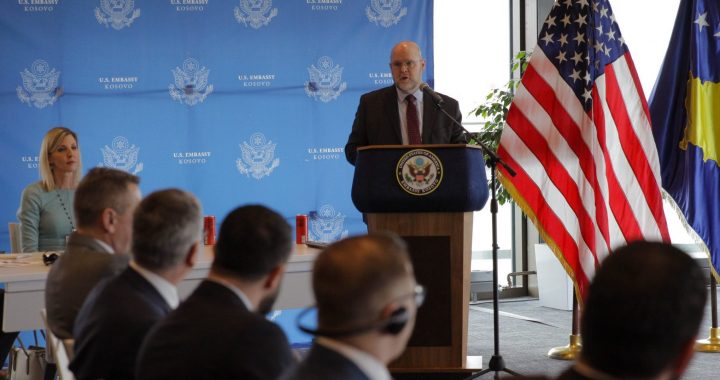

 Photo from the archives. US ambassador to Kosovo Jeffrey Hovenier during the meeting in Prishtina, January 31 2023. Photo: Twitter/USAmbKosovo
Photo from the archives. US ambassador to Kosovo Jeffrey Hovenier during the meeting in Prishtina, January 31 2023. Photo: Twitter/USAmbKosovo
The US embassy in Prishtina held the first meeting between representatives of Kosovo Albanians and Serbs to air their differences about the sensitive topic of the proposed Association of Serb-Majority Municipalities.
The US embassy in Prishtina on Tuesday held a meeting of political and civil society representatives of Kosovo Albanians and Serbs to discuss the Association of Serb-Majority Municipalities, a proposed body to represent minority Serb interests in Kosovo which has become a sticking point in the ongoing dialogue to normalise relations between Belgrade and Pristina.
No solution was reached to the deadlock after the more than two hours of discussion that was closed to the public, and which US ambassador to Pristina Jeffrey Hovenier considered as “a listening session”.
Sazan Ibrahimi, executive director of the Association of Kosovo Municipalities, an independent body which brings together all Kosovo’s mayors, said that the meeting was “constructive” and “all sides were heard on what they think about the Association of Serb-Majority Municipalities”.
“It was discussed how the Association could function within Kosovo’s legal framework and how this body could address issues related to health, education and economic development,” Ibrahimi told BIRN.
“It was apparent that there was a willingness to resolve the problems from both sides,” he said, adding that “it is important that there is a will to talk and find a way to take Kosovo forward”.
Serbia and Kosovo agreed during talks in Brussels in 2013 to establish a semi-autonomous municipal association for the Serb minority, an agreement that was then ratified by the Kosovo parliament. But so far it has not been set up and pressure on the Kosovo government has been growing as Kosovo’s Western backers push for a deal with Serbia.
“We continue to advocate for implementation of all dialogue commitments,” Hovenier wrote on Twitter after the meeting at the US embassy.
Milica Andric Rakic from the North Mitrovica-based NGO New Social Initiative said after Tuesday’s meeting that Association of Serb-Majority Municipalities, the services it would provide and how it will fit into Kosovo’s system were among the main topics discussed.
“There was not a joint conclusion from the meeting; the positions are very, very different,” Andric Rakic told media.
“The [Kosovo] government representatives mostly spoke about the problems that they have with the idea, that they are not convinced that there is need for such a body and that the [2007] Ahtisaari plan should already allow a lot of rights to the Kosovo Serb community, whereas Kosovo Serb representatives spoke about the deficiencies of the Ahtisaari plan, the issues that they have with importing books, importing medicine and accessing pretty much basic services in Kosovo due to language barriers, but other problems as well,” she said.
The 2007 Ahtisaari plan, which sets the basis for Kosovo’s constitution, specifies that the municipalities where Serbs constitute the majority should have a high degree of control over their own affairs.
Aleksandar Arsenijevic, leader of the Serbian Endurance (Srpski Opstanak) political organisation, told media that “this meeting was very productive and such meetings will surely lead to some good solution”.
“We had great exchanges of opinion and also conflicting views about the Association of Serb-Majority Municipalities, but what is most important is that everyone understood that the Association of Serb-Majority Municipalities must represent the Serb community in Kosovo and protect the rights of the Serb community,” Arsenijevic said.
Arsenijevic told media that because of the rules under which the meeting was held, he cannot reveal any further details.
The opposition Democratic Party of Kosovo, PDK, was also vague about the meeting, only issuing a statement saying that the party has “constantly given necessary support and has encouraged the government to reach a comprehensive and legally binding agreement with Serbia, centred on mutual recognition”.
The meeting was scheduled amid a US and EU joint diplomatic offensive to convince Serbia and Kosovo to accept an EU-backed proposal for an agreement on future relations European known as the Franco-German plan.
The official text of deal has not been published, but based on officials’ statements and alleged leaks in Belgrade-, Tirana- and Brussels-based media, the deal requires both sides to “develop normal, good neighbourly relations with each other based on equal rights”; to “reaffirm the inviolability now and in the future of the frontier/boundary existing between them and undertake fully to respect each other’s territorial integrity”; also to exchange “permanent missions”; and commit to “mutual respect of each party’s jurisdiction”.
In practice, the deal apparently means Serbia will not prevent Kosovo from becoming a member of the UN.
However, Kosovo’s Prime Minister Albin Kurti has been resisting the growing international pressure to resume talks on setting up the Serb municipality association, which his Vetevendosje party strongly opposed in opposition, holding protests and setting off tear gas in parliament.
This has drawn criticism from Kosovo’s leading ally, the US, as it makes a renewed push to secure backing for a normalisation deal.
Derek Chollet, counsellor of the US State Department of State and Gabriel Escobar, US special envoy for the Western Balkans, said in an article published by Albanian- and Serb-language media outlets Koha Ditore and KosSev on Monday that by establishing the Serb municipality association, Kosovo would move further towards being “integrated into Euro-Atlantic structures”.
Chollet and Escobar wrote that “the implementation of the Association… agreement is an outstanding, legally-binding, international obligation that requires action from Kosovo, Serbia, and the EU and an existing commitment from the United States in support of the EU-facilitated dialogue”.
31 January 2023 - 19:16

The high-level dialogue between Kosovo and Serbia has been low on the ...

Kosovo authorities opened a new river bridge in the ethnically divided...

European Union High Representative for Foreign Affairs, Kaja Kallas, d...

Kosovo’s Foreign Minister Donika Gervalla Schwarz considered Serbia�...